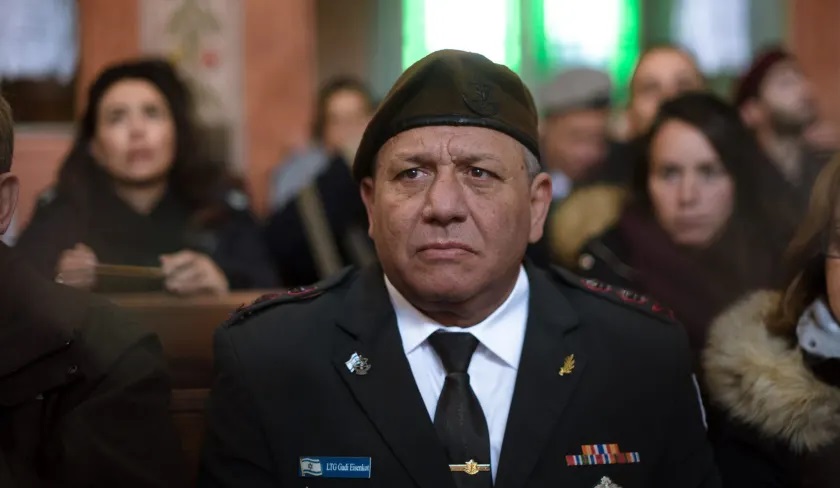Israeli Military Chief Gives Unprecedented Interview to Saudi Media: 'Ready to Share Intel on Iran'
Israel and Saudi Arabia are in full agreement about Iran's intentions, Lt. Gen. Gadi Eisenkot tells Elaph, noting the two states have never fought each other
By Amos Harel
Ha'aretz, November 17, 2017
Israeli military chief of staff Gadi Eisenkot.
Credit: IDF Spokesperson
A Saudi newspaper published an unprecedented interview on Thursday with the Israeli military chief, Lt. Gen. Gadi Eisenkot. It marks the first time any senior Israel Defense Forces officer, let alone the chief of staff, has been interviewed by a media organization in Saudi Arabia, which does not have diplomatic ties with Israel.
In the interview to the Saudi online newspaper Elaph, Eisenkot called Iran the "real and largest threat to the region." He said Israel and Saudi Arabia are in complete agreement about Iran's intentions.
He also noted that Israel and Saudi Arabia have never fought each other.
Eisenkot said that Israel's military situation has never been better. He said that was why it is "highly regarded by the moderate countries in the region."

Israel's military chief accused Iran of trying to destabilize the region by building weapons factories and supplying advanced arms to guerilla and terrorist organizations across the Middle East.
"Iran seeks to take control of the Middle East, creating a Shi'ite crescent from Lebanon to Iran and then from the [Persian] Gulf to the Red Sea."
"We must prevent this from happening," he added.
Eisenkot said Israel has no intention of initiating an attack on Hezbollah in Lebanon. "We see Iranian attempts at bringing about an escalation, but I don't see a high chance for this at the moment."
He cautioned, however, that local flare-ups could "lead to a broad strategic conflict."
The interview follows the news that broke two weeks ago of Lebanese Prime Minister Saad Hariri’s tumultuous resignation, and the wave of arrests of Saudi princes, ministers and businessmen – along with direct public threats by Saudi Arabia, and Israel aimed at Iran and Hezbollah.
Eisenkot also commented on the Middle East policies of the American and Russian governments. He said he welcomed U.S President Donald Trump’s announcement that it is necessary to put an end to the Iranian ballistic missile program and Iran’s growing hold in Syria and Iraq.
“I view it as hope for the region,” he said.
“With President Trump. there is an opportunity to build a new international coalition in the region. We need to carry out a large and inclusive strategic plan to stop the Iranian danger. We are willing to exchange information with moderate Arab countries, including intelligence information in order to deal with Iran,” added Eisenkot.
As to whether Israel has already shared such information with Saudi Arabia, Eisenkot said: “We are willing to share information if there is a need. We have many shared interests between us.”
Eisenkot said Israel and the Saudis are on the same page about Iran: “I participated in the meeting of chiefs of staff in Washington and heard what the Saudi representative said. It is precisely what I think concerning Iran and the need to deal with it in the region and the need to stop its program of expansion.”
Eisenkot was blunt about what extended Iranian presence in Syria would mean.
“Our demand is for Hezbollah to leave Syria and for Iran and its militias to retreat from Syria. We have said openly, and also quietly and secretly too, that we will not accept Iranian consolidation in Syria in general, and their concentration west of the Damascus – Sweida Road [about 50 kilometers from the Israeli border on the Golan Heights]. We will not allow any Iranian presence, we have warned them against building factories or military bases and we will not allow it,” he said.
He described as "complicated" the internal situation in Lebanon.
“Hariri’s move in resigning from Riyadh was surprising, but I see that Hezbollah has begun to feel financial pressure. They have run into serious problems with supplies. We also see a drop in support for Hezbollah and there are also cracks in the public that supports Hezbollah, as well as demonstrations in the Dahiya [neighborhood of Beirut, a Shi’ite stronghold]. That is something we haven’t seen in the past.”
He also gave additional insight into how Israel views American and Russian policy in the Middle East.
“The United States is trying to strengthen and support the moderate Sunni axis in the region without bringing in [American] troops or fighting on the ground. At the same time, there is a Russian policy that sees only the Russian interests in Syria,” said Eisenkot. “The Russians know how to get along very well with all the sides. They forged an alliance with Assad, Iran and Hezbollah on one side (and) with the Americans in the war against ISIS."
He added that the system they have worked out in which Russia acts as a channel between Turkey and Israel in order to prevent potential friction between the two countries has worked out very well.
“The United States is trying to strengthen and support the moderate Sunni axis in the region without bringing in [American] troops or fighting on the ground. At the same time, there is a Russian policy that sees only the Russian interests in Syria,” said Eisenkot. “The Russians know how to get along very well with all the sides. They forged an alliance with Assad, Iran and Hezbollah on one side (and) with the Americans in the war against ISIS."
He added that the system they have worked out in which Russia has channels with both Turkey and Israel in order to prevent potential military friction between the two countries has worked out very well.
“ISIS has been severely beaten and the elimination of the organization will come soon. But its ideas can return in the guise of other names and groups in Syria and the region,” he said.
He also explained Israel's long-time policy not to get involved with the fighting in Syria.
“We have a clear policy. We will not intervene in the fighting in Syria, unless we see an attempt to harm our Druze brothers. We intervened in Khader, we prepared tanks on [Mount] Hermon and warned the Al-Nusra Front that we will attack them if they enter Khader. This put an end to the crisis.”
When asked if Israel provides aid to Al-Nusra, the Syrian jihadist group with links to Al Qaida, Eisenkot rejected such claims are totally unfounded. “Al-Nusra and its ilk are our enemies, like ISIS. We have attacked them more than once. We aid the villagers on the Golan medically and we help our Druze brothers. We help only in humanitarian ways.”
|
Races? Only one Human race United We Stand, Divided We Fall |
 |
No time to waste. Act now! Tomorrow it will be too late |
|


































